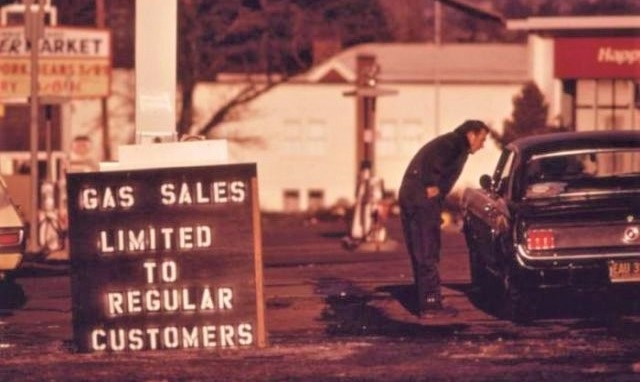Looking back on the 1973 oil crisis
“Petroleum Weapons”
During the 1950s and 1960s, the United States controlled 90% of all oil exports from developing countries. By 1969, America’s domestic oil production had peaked and was unable to meet the growing demand for vehicles. The United States imported 350 million barrels per year in the late 1950s, mainly from Venezuela and Canada. Because of shipping costs and tariffs, they never buy much oil from the Middle East. Between 1970 and 1973, US crude oil imports nearly doubled, reaching 6.2 million barrels per day in 1973, with the Middle East accounting for 66 percent of the oil supply.

Oil has become an effective weapon; Source: thevintagenews.com
Oil-producing Arab countries have tried to use oil as a lever to influence political events. The first was the Suez Crisis of 1956 when Britain, France and Israel invaded Egypt. During the conflict, Syria sabotaged both the Trans-Arab pipeline and the Iraq-Baniya pipeline, disrupting oil supplies to Western Europe. The second case occurred in 1967, when war between Egypt and Israel broke out but the embargo lasted only a few months.
Although some members of the Organization of the Arab Petroleum Exporting Countries (OAPEC) support using oil as a weapon to influence the political outcome of the Arab-Israeli conflict, Saudi Arabia has historically still strongly supported separating oil from politics. The Saudis have been wary of this tactic given the availability of oil from non-Arab oil-producing countries, and the region’s conservative monarchies rely on Western support to ensure their continued existence.
On October 6, 1973, Egypt attacked the Bar Lev line on the Sinai Peninsula and Syria launched attacks on the Golan Heights, both of which were occupied by Israel in the 1967 Six-Day War. On October 10, 1973, US President Nixon authorized the deployment of Operation Nickel Grass, a strategic airlift to transferred weapons and supplies to Israel to increase material losses, after the Soviet Union began sending weapons to Syria and Egypt. To punish arms supplies to Israel, the Organization of the Petroleum Exporting Countries (OPEC) took unprecedented action to stop oil supplies to the US and Europe.
On October 17, Arab oil producers cut output by 5% and imposed an oil embargo on Israel’s allies – the US, Canada, Japan, Great Britain, the Netherlands, Rhodesia, South Africa and Portugal. By December, production had been cut to 25% from September levels. The embargo caused the oil crisis, or “shock”, with many short-term effects and long-term effects on global politics and the economy, which to this day is still considered the largest. in history.
When the embargo ended in March 1974, oil prices nearly quadrupled globally, increasing tensions between the US and some of its European allies, who blamed the US for triggering the embargo.
Consequence
Internationally, rising prices have changed the competitive position of many industries. At gas stations in the West, the queues are miles long; some countries enact regulations to limit the daily consumption of gasoline for private vehicles; urban compact cars began to appear instead of the luxury but expensive limousines that were in demand in the 50s and 60s The economy could not grow without consuming large quantities of gasoline and other petroleum products. The embargo has led oil companies to look for new ways to increase oil supplies, even in dangerous terrain like the Arctic.

The 1973 oil crisis was said to be in danger of repeating itself; Source: thevintagenews.com
From May 1973 to June 1974, in the United States, the average retail price of a gallon of regular gasoline increased 43 percent. The state government asked people not to hang Christmas lights. Oregon has completely banned Christmas and commercial lighting. Politicians are calling for a nationwide gasoline distribution program, asking gasoline retailers to voluntarily stop selling gasoline on weekend nights.
Disruptions to production, distribution, and prices are responsible for recessions, periods of excessive inflation, declining productivity, and lower economic growth. Some researchers consider the 1973 and 1973-1974 “oil shocks” that accompanied the stock market crash to have a lasting effect on the US economy, necessitating addressing threats to the US economy with energy security.
Britain, Germany, Italy, Switzerland and Norway banned flying, driving and sailing on Sunday. Sweden cuts gasoline and oil for heating. The Netherlands imposes prison sentences for those who use more than their electricity allotment. Of the nine members of the European Economic Community (EEC), the Netherlands faces an immediate embargo. Britain and France received almost uninterrupted supplies, as a reward, for refusing to allow the US to use the airfield and stopping supplying Arab and Israeli weapons and supplies.
at Blogtuan.info – Source: cafebiz.vn – Read the original article here



